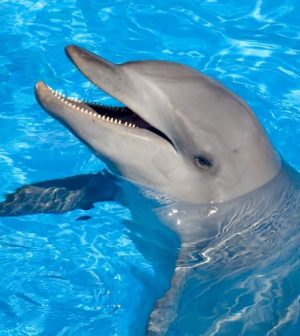- Could Your Grocery Store Meat Be Causing Recurring UTIs?
- Are You Making This Expensive Thermostat Error This Winter?
- Recognizing the Signs of Hypothyroidism
- 10 Strategies to Overcome Insomnia
- Could Artificial Sweeteners Be Aging the Brain Faster?
- Techniques for Soothing Your Nervous System
- Does the Water in Your House Smell Funny? Here’s Why
- Can a Daily Dose of Apple Cider Vinegar Actually Aid Weight Loss?
- 6 Health Beverages That Can Actually Spike Your Blood Sugar
- Treatment Options for Social Anxiety Disorder
Stranded Dolphins’ Brains Show Alzheimer’s-Like Changes

Groups of whales, dolphins and porpoises are regularly stranded in shallow waters around the coasts of the United Kingdom.
Researchers wanted to understand why, so they studied the brains of 22 toothed whales — or “odontocetes” — that were stranded in Scottish coastal waters.
The study included five species — Risso’s dolphins, long-finned pilot whales, white-beaked dolphins, harbor porpoises and bottlenose dolphins. The research showed that four of the stranded animals from different dolphin species had some brain changes associated with Alzheimer’s disease in humans.
“These are significant findings that show, for the first time, that the brain pathology in stranded odontocetes is similar to the brains of humans affected by clinical Alzheimer’s disease,” said lead researcher Dr. Mark Dagleish of the University of Glasgow.
“While it is tempting at this stage to speculate that the presence of these brain lesions in odontocetes indicates that they may also suffer with the cognitive deficits associated with human Alzheimer’s disease, more research must be done to better understand what is happening to these animals,” Dagleish said in a university news release.
The researchers said their results could support the “sick-leader” theory. This means that healthy dolphins would find themselves in dangerously shallow waters after following a confused or lost group leader.
While stranded odontocetes can sometimes be moved to deeper waters by teams of experts, others die.
For the new research, the investigators examined the brains of animals in this study for hallmarks of Alzheimer’s disease, including so-called plaques and tangles.
The team found that the brains of all of the aged animals had amyloid-beta plaques.
Three of the animals they studied — each from a different odontocete species — also had other dementia-related signs in their brains.
This showed that some odontocete species develop Alzheimer’s-like brain features.
Study co-author Frank Gunn-Moore is head of the school of biology at the University of St. Andrews, in Scotland. He said, “I have always been interested in answering the question: do only humans get dementia? Our findings answer this question as it shows potential dementia-associated pathology is indeed not just seen in human patients.”
Another author, Tara Spires-Jones of the University of Edinburgh, said researchers were fascinated to see brain changes in aged dolphins that were similar to those in humans.
“Whether these pathological changes contribute to these animals stranding is an interesting and important question for future work,” she said.
The findings were published online recently in the European Journal of Neuroscience.
More information
The Alzheimer’s Association has more on Alzheimer’s disease.
SOURCE: University of Glasgow, news release, Dec. 19, 2022
Source: HealthDay
Copyright © 2026 HealthDay. All rights reserved.










